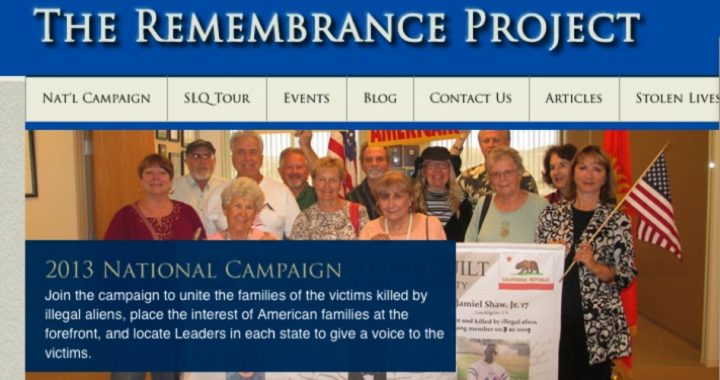
Members of the Houston-based Remembrance Project, which was formed to bring comfort to families of Americans killed by people in the United States illegally, recently traveled to the state capitol in Austin to support the passage of SB 185, a bill to prohibit cities from implementing policies that would interfere with local police enforcement of state or federal immigration laws.
Though Maria Espinosa, director and co-founder of the Remembrance Project, is of Hispanic heritage, and the organization recently launched an effort to recruit Hispanic conservatives to support SB 185, membership in the group is not exclusive to people of Hispanic origin.
SB 185, authored by Senator Charles Perry (R-Lubbock), would specifically prevent local municipalities in Texas from prohibiting their law enforcement officers from “inquiring into the immigration status of a person lawfully detained for the investigation of a criminal offense or arrested,” as well as exchanging information relating to the detainee’s immigration status with U.S. Citizenship and Immigration Services or U.S. Immigration and Customs Enforcement.
It would also prevent municipalities from prohibiting their police officers from “assisting or cooperating with a federal immigration officer as reasonable and necessary, including providing enforcement assistance.”
The Texas Senate passed a similar measure in 2011, but protests prevented it from being passed into law. But Espinosa is optimistic about the new bill’s chances in the state legislature. “We have more Latinos who are behind this issue and also law enforcement,” she told Fox 26 News in Houston. “We have [four] sheriffs who testified with us to remove sanctuary city policies.”
However, noted Fox 26 News, other Hispanic law enforcement officials, including Harris County Sheriff Adrian Garcia, testified in opposition to SB 185.
Espinosa disagreed with assertions made by some critics of the bill that it would encourage racial profiling. “I have never been pulled over. My daughter has never been pulled over, and none of her friends have been pulled over because of profiling,” said Espinosa. “We have to weigh the odds. We have families and we took families with us to the hearing whose loved ones were killed [by illegal aliens]. Their children were killed by people who should not have been in the country in the first place. There is no comparison in lives lost to someone being detained [for questioning] for five or ten minutes.”
Another Hispanic Texan who has joined Espinosa in support of SB 185 is Pedro Rivera, a retired military veteran. “I’m an American citizen and I believe in the rule of law,” Rivera told My Fox Houston. “And being Hispanic, I should not be granted special privilege in avoiding the law. We need officers to have all the tools available to them to keep us safe. That includes asking the question, when you’re being detained for a crime or being arrested for an offense, ‘are you here illegally? Are you a U.S. citizen?’ ”
The online mission statement of Remembrance Project, founded in 2009, notes that it “educates, raises awareness, and conducts outreach in order to support and protect Americans and their families’ well-being and safety through upholding U.S. laws and following the Constitution.”
Since 2011, the group has help organize an annual National Day of Remembrance in multiple places around the country in honor of those who were killed by illegal aliens. Many of those victims were killed by illegals who were driving while intoxicated, while others were murdered by illegals who were members of violent gangs, some of which were Asian in origin.
In an article about the Day of Remembrance last November, Jessica Vaughan of the Center for Immigration Studies reported that Espinoza had called on President Obama to direct federal funding for restitution to American families who have lost loved ones to illegal aliens, as well other educational efforts. Espinoza said the funding could come from fees paid by illegal aliens getting work permits under the administration’s Deferred Action for Childhood Arrivals (DACA) program.
“The redistribution of these funds to our victim families, in accordance with an already established formula of victim compensation, will provide hope to all aggrieved American families that their American leader truly understands their plight and that you will, as the First Lady often says, place ‘American families first,’” wrote Espinoza to Obama.
Vaughan wrote that neither DHS nor ICE has programs in place to aid victims of criminal aliens. ICE’s public advocate, Andrew Lorenzen-Strait, told Vaughan on two occasions that he intends to devote more effort to victim compensation, but has produced nothing. He has instead, noted Vaughan, devoted “his considerable staff and resources to helping illegal aliens win release from detention and deportation.”
After U.S. District Judge Andrew Hanen of the U.S. District Court for the Southern District of Texas in Brownsville issued an injunction on February 16 that blocked the federal government from implementing the Obama administration’s use of executive actions to grant amnesty to four million illegal aliens, the Remembrance Project issued a press release supporting the judge. The release stated:
What millions of Americans have all known and have expressed was reinforced by a federal judge in the Southern District of Texas late yesterday: the president is usurping the U.S. Constitution by declaring amnesty for illegal aliens through executive directives.
The release also quoted a statement from Jamiel Shaw, whose son, Jamiel Shaw II, was murdered in Los Angeles in 2008 by an illegal alien, Pedro Espinoza, who was identified as a gang member. Espinoza was released after serving half of an eight-month sentence for displaying a firearm in a park and resisting arrest.
“We are so thankful that the judge did his job, and it makes us feel like there is some hope for our families. So many people are fighting to save our country and it is very encouraging,” said Shaw.
Noting that there are attorneys general in 13 states who oppose Judge Hanen’s ruling, California’s state director for The Rememrance Project, Robin Hvidston, asserted,
We currently have state directors in 9 of those 13 states and our directors are eager to educate their AG’s. We will share the necessary facts that will allow these AG’s to, hopefully, side with the rule of law.
As The New American noted in a recent article, the number of states sympathetic to the Obama administration’s plan to grant amnesty to millions of people and joining in an amicus brief in support of the DOJ’s motion to appeal Judge Hanen’s decision has grown to 14, plus the District of Columbia. They include Washington, California, Connecticut, Delaware, Hawaii, Illinois, Iowa, Maryland, Massachusetts, New Mexico, New York, Oregon, Rhode Island, and Vermont.
Related articles:
Obama Immigration Amnesty Action Is on Hold as Appeals Are Planned
Federal Judge Stops Obama Executive Action Amnesty
More States Suing Feds Over Immigration Executive Orders
States Sue Obama Administration Over Executive Order on Immigration



